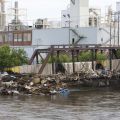How to Properly File an Insurance Claim
4nov 2021

Water damage, whether caused by flooding or a hurricane, takes a lot of time, effort and money to restore and clean.
Water damage, whether caused by flooding or a hurricane, takes a lot of time, effort and money to restore and clean. While there is little you can do to reduce the inconveniences and the emotional distress caused by the abrupt disruption of your daily routine, you can at least take some precautions to alleviate the burden on your budget. Purchasing adequate homeowners or renters insurance is your best bet to ease the financial strain of dealing with property damage. Your insurance company will cover the costs of repairing your home, helping you get your life back on track as soon as possible.
Does Renters Insurance Cover Water Damage?
While many renters focus on coverage for belongings if their rental is burglarized, it’s also important to consider coverage for water damage.
A basic renters insurance policy may provide coverage for personal property losses caused by:
- Windstorm or hail
- Weight of sleet, snow and/or ice
- Smoke
- Fire and/or lightning
- Explosions
- Freezing of plumbing systems
- Fire sprinkler failure/accidental discharge
- Accidental or sudden discharge of water from a plumbing system or other appliance
- Ceiling leaks
- Toilet flooding due to accidental overflow
Remember that renters insurance does not cover flood insurance, so to further secure a property, there is a need to purchase a separate policy for flood damage.
Filing an Insurance Claim
Most homeowners are not well-prepared and don’t even know where to begin when filing an insurance claim. There are some terms and conditions that have to be complied with, as well as specific steps to be taken to ensure a smooth claims process.
It is best to have ServiceMaster by Wright to assist you with all your damage and insurance claims.
It is best to have ServiceMaster by Wright to assist you with all your damage and insurance claims.
To make sure you get your due, follow these tips from ServiceMaster by Wright:
- Get in touch with your insurer or the agent who sold you the homeowner’s insurance. The insurance company will assign an adjuster, who will assess the damage and submit an estimate for review by the insurance company.
- Document all losses. After the damage, take photos of the damage and make a list of items that were destroyed or need repair. Include the amount you paid for the items and gather any receipts you can find. The more you can document your property losses before the insurance adjuster arrives, the faster the claims-filing process will go. A standard homeowner’s insurance policy not only covers damage to the home’s structure but also the homeowner’s personal property.
- Verify the adjuster’s identity. Scammers can show up after natural disasters. To protect yourself, ask the insurance company for the adjuster’s name before he or she arrives, then ask for identification before letting the person into your home.
- Show the adjuster all the damage. Make sure that you are home when the adjuster visits and that he or she gets a complete view of everything that was lost or damaged. It’s not enough just to walk through part of your home.
- Document all contact with the insurance company. After the adjuster leaves, remain in contact by email so that you have a backup of all your communication. Keep notes about when an adjuster visits, as well as any missed appointments, unreturned phone calls, what you discussed, and even if he or she was rude. Though you probably won’t need this information, it will be useful if any disagreements have to be resolved in court.
- Make copies of all documents. Copy everything you give to the adjuster, such as your list of properties lost or damaged. If the adjuster advises you to start water damage removal, hurricane damage restoration or mold remediation, get that permission in writing.
In an emergency, the first adjuster may be replaced by a new one during the claims process, so having correspondence in writing could be helpful to you. Get additional estimates if necessary.
Once your property has been restored by a restoration company in Fort Myers like ServiceMaster by Wright and you have been reimbursed from your insurance, be careful to prevent water damage in the future so that you don’t have to deal with all the troubles and hassles involved in the claims process and repair works. If, however, any property damage occurs despite the precautions you have taken, call to mind the above tips for filing a damage insurance claim.
Related items:
11/17/2020
How to Prevent Office Kitchen Fires
Commercial kitchen fires are something that need to be taken seriously. ServiceMaster by Wright discusses six important tips to prevent office kitchen fires to protect the employees and the business.
 3/21/2021
10 Ways to Improve Indoor Air Quality in Florida
3/21/2021
10 Ways to Improve Indoor Air Quality in Florida
Poor indoor air quality can have negative effects. ServiceMaster by Wright has compiled some tips to improve the air quality inside the home in order to maintain a safe and healthy environment.
4/22/2021
Water Damage: How the Contamination Level Changes the Mitigation Process
Many factors affect the water damage mitigation process, such as the level of contamination. Learn more in this article by ServiceMaster by Wright.
 5/21/2021
How to Prepare Youth for Emergencies and Disasters
5/21/2021
How to Prepare Youth for Emergencies and Disasters
Learn how to prepare youth for emergencies. For Florida water, fire, and storm damage restoration, call ServiceMaster by Wright at (239) 431-9947.
 8/25/2021
How to Deal With a Sewage Backup in Your Business
8/25/2021
How to Deal With a Sewage Backup in Your Business
ServiceMaster by Wright has compiled some tips to follow when a sewage backup happens in your commercial facility and how it can be prevented.